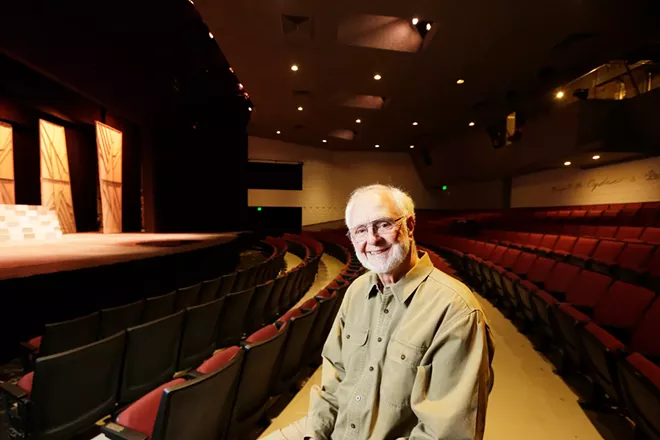In the theater world, playwrights-in-residence are writers who commit themselves to a particular venue for a set period of time. It's intended to be a symbiotic relationship, with the theater giving the playwright access to the resources needed to bring a script to the stage, and the playwright ideally using that fertile environment to provide the theater with fresh and exciting work.
Typically, resident playwrights have a term of a season or two. But there are exceptions. Some can last a few years.
Or, in Bryan Harnetiaux's case, four decades.
Harnetiaux's involvement with the Spokane Civic Theatre started when the organization itself was, in his own words, "the biggest game in town," yet still young by institutional standards. He had moved to Spokane from the Los Angeles area to attend Gonzaga in 1965; and in 1973, having wrapped up his law degree, he decided to audition for The Importance of Being Earnest. The director, incidentally, was Margot Ogden, to whom, along with her husband, Robert, the Civic's main auditorium is now dedicated.
"It was after night school, and I had all these free evenings. So I just came down and tried out for a play," Harnetiaux says. Roles in Bus Stop and A Thousand Clowns followed. He became the recurring narrator for the Civic's regular production of A Christmas Carol.
"Other than that, I proclaim no real acting skills. It's just kind of one person's community theater journey. But it ignited my writing," he says.
By June 1977, Harnetiaux had a one-act play of his staged "downstairs" — shorthand for the experimental basement room with "penitential seats," as described by local critic Mike Siconolfi — that would eventually, with Harnetiaux's help, become the Civic's proper Studio Theater. Over the next three years, several more of his short plays were staged there.
Then, in 1980, his full-length comedy Dumb Luck got the main stage treatment. Eager to promote their homegrown dramatic talent, the Civic brought in a big-league critic who wrote reviews for United Press International.
"He just blasted me. I was devastated. But it was straightforward, and it was valid," Harnetiaux says.
In response to the negative press, Harnetiaux's circle of champions hired local film critic Bob Glatzer to write a second review of Dumb Luck with "maybe a little better hometown perspective."
"And Bob blasted me, too," he laughs. "So that's how my career upstairs started."
Humbled but undaunted, Harnetiaux pressed on with writing new work for the evolving studio space.
"In '82, I made the decision to leave the full-time practice of law so that I could write more. And, as it happens, I stumbled into an academic law practice that allowed me to spend much more time writing," he says. That same year, Civic executive director Betty Tomlinson took him out for a fortuitous lunch.
"Out of the blue, she says to me, 'How would you like to be playwright-in-residence?' And there's never been a shred of paper about what that means, but it was loosely understood that if I had something ready to mount, I could develop it here — at least downstairs if not upstairs," he says.
The plays that Harnetiaux went on to develop would result in life-altering collaborations and even national recognition.
In 1998, there was National Pastime, which recounts Jackie Robinson's historic rupture of Major League Baseball's color line some 50 years earlier. The play was ultimately selected out of more than a thousand by Jim and Lissa Reynolds' then-relatively new Fremont Centre Theatre in Robinson's (and Harnetiaux's) childhood stomping ground of Pasadena, California.
Local teacher and actor David Casteal, who starred as Robinson in the Civic's initial run of National Pastime, would then co-develop York with Harnetiaux in 2004. York is a one-man play about the only black explorer among Lewis and Clark's 40-member Corps of Discovery. Harnetiaux wrote the script; Casteal created the Djembe drum rhythms that drive the story. The play brought the duo to cities like Portland, San Antonio and New York.
During all this, Harnetiaux had also been working on a cycle of end-of-life plays. Holding On, Letting Go appeared in 2012 to complete that trilogy that also included Vesta (1996) and Dusk (2007). Originally written for members of Spokane's pioneering all-black Onyx Theater Troupe, Holding On, Letting Go was selected and featured as a main stage production at the National Black Theatre Festival in Winston-Salem, North Carolina, the following year.
For his 40th year in residence and the Civic's 75th anniversary, Harnetiaux is back in the theater's familiar Firth J. Chew Studio to debut his latest work, Exile, which has "been sitting in drydock," he says, while waiting for COVID to pass. Featuring a cast of six, the play was inspired by his thoughts after attending his 50th high school reunion.
"It's about a son, 40 years later, returning to his hometown and reuniting with his sister and reexamining their childhood. So it's a family drama, and it's a bit of a ghost story. There are two nonspeaking parts who are 'presences' throughout the play," he says. Veteran actor Jerry Sciarrio is directing this inaugural run.
Along with Exile, the Civic also aims to produce National Pastime later this season. That planned 2023 revival coincides with the 75th anniversary of Robinson's landmark desegregation achievement — which, according to one 1947 poll, put Robinson behind only Spokane's own Bing Crosby as the most popular man in the country. New York-based writer, director and producer Pat Golden is slated to direct.
As he contemplates the debuts and revivals scheduled for this season, what causes Harnetiaux to marvel isn't the longevity of his tenure. It's the fact that the opportunity even existed in the first place.
"It's unusual for a community theater to have a playwright-in-residence. That's why I've always felt such gratitude for that. The hardest thing for a playwright is to find a home for their work," he says. And 40 years on, he still can't quite believe his luck.
"Every time I look at a program, I check to see if I'm still listed." ♦
Exile • Oct. 28-Nov. 6; Thu-Sat at 7:30 pm, Sun at 2 pm • $25 • Spokane Civic Theatre • 1020 N. Howard St. • spokanecivictheatre.com • 509-325-2507






























